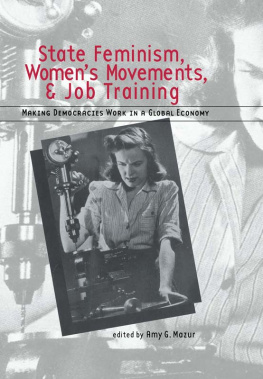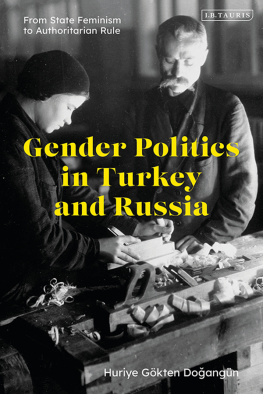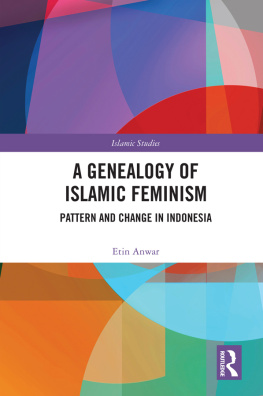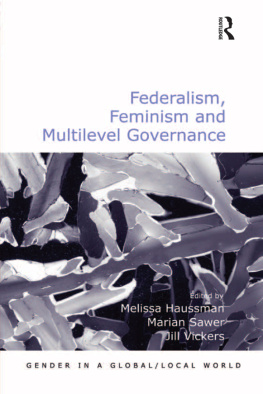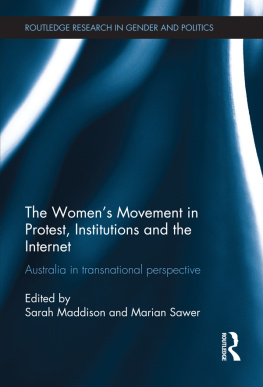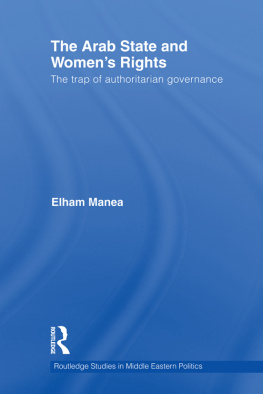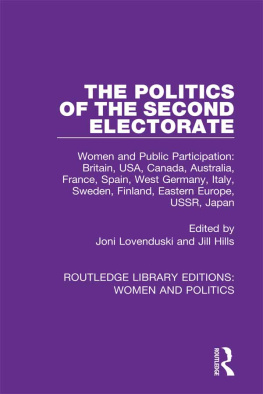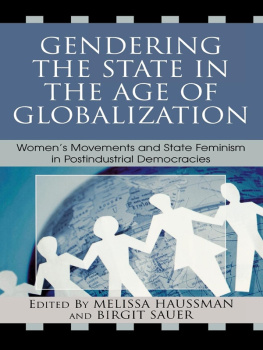STATE FEMINISM, WOMEN'S MOVEMENTS, AND JOB TRAINING
STATE FEMINISM, WOMEN'S MOVEMENTS, AND JOB TRAINING
Making Democracies Work in the Global Economy
Edited by
Amy G. Mazur
Published in 2001 by
Routledge
270 Madison Ave
New York NY 10016
Published in Great Britain by
Routledge
2 Park Square, Milton Park
Abingdon, Oxon, OX14 4RN
Routledge is an imprint of the Taylor & Francis Group
Transferred to Digital Printing 2010
Copyright 2001 by Amy G. Mazur
All rights reserved. No part of this book may be reprinted or reproduced or utilized in any form or by any electronic, mechanical, or other means, now known or hereafter invented, including photocopying and recording, or in any information storage or retrieval system, without permission in writing from the publisher.
Library of Congress Cataloging-in-Publication Data
State feminism, women's movements, and job training : making democracies
work in the global economy / edited by Amy G. Mazur.
p. cm. (Women and politics in democatic states)
Includes bibliographical references and index.
ISBN 0-8153-3438-9 (hc.)
1. WomenGovernment policyEuropean Union countries. 2.
WomenEmploymentGovernment policyEuropean Union countries.
3. Job trainingGovernment policyEuropean Union countries. 4.
FeminismEuropean Union countries. I. Mazur, Amy. II. Series.
HQ1236.S732 2001
305.42dc21 00-069679
Publisher's Note
The publisher has gone to great lengths to ensure the quality of this reprint
but points out that some imperfections in the original may be apparent.
To
Geno
and
Minerva
Table of Contents
Barbara Burrell
Amy G. Mazur
CHAPTER 1.
Introduction
Amy G. Mazur
CHAPTER 2.
Gender Politics in the European Union: The Context for Job Training
Catherine Hoskyns
Constanza Tobo
Birgit Buchinger and Sieglinde Katharina Rosenberger
Katie Verlin Laatikainen
Celia Valiente
Marila Guadagnini
Amy G. Mazur
Anne Maria Holli
Anne Good
Kathy Teghtsoonian and Joan Grace
Dorothy McBride Stetson
Amy G. Mazur
APPENDIX 1.
RNGS Worksheets and Independent Variable Indicators
APPENDIX 2.
Country Guide to the Bibliography
List of Tables
Women's Policy Agency Activities (WPAA) and Women's
Movement Impact/State Response (WMI/SR) in the EU |
Women's Policy Agency Activities (WPAA) and Women's
Movement Impact/ State Response (WMI/SR) in Spain |
Women's Policy Agency Activities (WPAA) and Women's
Movement Impact/State Response (WMI/SR) in Italy |
Women's Policy Agency Activities (WPAA) and Women's
Movement Impact/State Respone (WMI/SR) in France |
Women's Policy Agency Activities (WPAA) and Women's
Movement Impact/State Response (WMI/SR) in Finland |
Women's Policy Agency Activities (WPAA) and Women's
Movement Impact/State Response (WMI/SR) in Ireland |
Women's Policy Agency Activities (WPAA) and Women's
Movement Impact/State Response (WMI/SR) in Canada |
Women's Policy Agency Activities (WPAA) and Women's
Movement Impact/State Response (WMI/SR) in the United States |
Comparing Findings by Women's Movement Impact/State
Response |
Comparing Findings By Structure of Employment/Job Training
Subsystem |
Comparing Findings By Presence of Parallel Equal Employment
Subsystem |
List of Figures
Series Editor's Preface
T HE SERIES WOMEN AND POLITICS IN DEMOCRATIC STATES IS DEVOTED to research on the engagement of women more equally in political leadership across democratic nations, the ways in which women have engaged in and are transforming politics in these states, and their impact on governing. The examination of the interrelation of gender, politics, and policy is the hallmark of works published as part of this series. Through its examination of the gendering of policy debates in western postindustrial states, the Research Network on Gender, Politics, and the State (RNGS) makes a central contribution to the series' goals.
At the broadest level, the Network is concerned with the capacity of postindustrial states to become more democratic. A major way in which these states can become more democratic is through a conscious inclusion of women's concerns, women's lives, and their perspectives in policy debates and outcomes. The RNGS research focuses on how women's movements have intersected with women's policy offices to introduce gender into public policy debates across a range of issues and countries and what accounts for levels of success in gendering these debates. In State Feminism, Women's Movements, and Job Training: Making Democracies Work in the Global Economy, these scholars focus on debates in the job training policy area in a comparative research design including the nations of Spain, Austria, Italy, France, Finland, Ireland, Canada, and the United States and the supranational European Union (EU) level.
Job training policies are one of five policy areas of research being undertaken by the Network. The resulting work will provide us with a large quantitative data base upon which encounters between women's movements and women's policy offices can be analyzed across policy areas to evaluate the impact of women's movements on state policy making.
Barbara Burrell
Preface and Acknowledgments
T HIS BOOK IS A PART OF A LARGER COMPARATIVE RESEARCH PROJECT ON women's policy offices designed and conducted by the Research Network on Gender, Politics, and the State. Fifteen other women and I founded the group in 1995, following the publication of an initial comparative volume on women's policy offices, Comparative State Feminism. The edited volume took a first step in studying national-level women's policy offices in 14 Western postindustrial democracies and in Poland. Our network's founding principle was to address the weaknesses of the first study in a much larger and more ambitious companion study. The first weakness was methodological. Each national study was a case study of a single national-level office and, hence, together the 14 national studies could be used to generate hypotheses only about women's policy offices.
A second important weakness was related to the use of concepts across different cultural settings. The original study selected a single area of public policy to evaluate whether women's policy offices had any influence in making policies more feminist, equal employment policy. This policy area was not only limited to one small area of government action, but examining equal employment policy indicated only a very narrow avenue to women's emancipation through equal rights in paid labor that for many of us represented an Anglo-American/liberal feminist approach (e.g., Skjeie 1997). Another weakness was that the analytical framework did not adequately account for the difficulties in analyzing the full complexity of women's policy offices and women's movements in a cross-national perspective.

